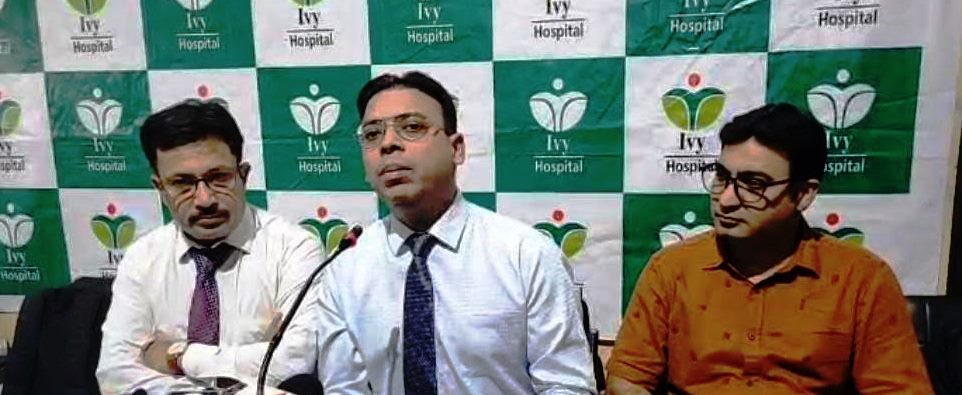news details |
|
|
| Obesity leading cause of liver damage: Dr Amit Garg | | | 
Early Times Report
Jammu, June 16: “A recent study puts an alarming 70 percent of India’s urban population in the obese or overweight bracket taking the country right in the middle of a fat explosion. According to a study published in Lancet, India is just behind the US and China in this global hazard list of top 10 countries with the highest number of obese people.”
Dr Amit Garg, associate director bariatric & metabolic surgery at Ivy Hospital, Mohali while addressing a press conference at Jammu Press Club today said that 30 million of India’s adult population is either overweight or obese and 62 million diabetic Indians exhibit unique features of obesity like excess body fat, abdominal adiposity, increased subcutaneous (under skin) and intra-abdominal fat, and deposition of fat in ectopic sites such as liver, muscle and others,”
Dr. Garg further informed that obesity is a major driver for the widely prevalent type-2 diabetes & other commonly associated diseases are obstructive sleep apnea, osteoarthritis, low self-esteem, depression, menstrual irregularities, infertility, hernias, cancers and heart failure.
He said, “It is a common myth that obesity is a rich man's disease. In reality, obesity is not only caused due to over-eating, but also due to adopting wrong eating habits. Therefore, obesity can affect both rich and poor altogether. Losing even 5-10 percent of your weight can delay or prevent some of the diseases discussed above. These results can often come from fitness centers, dieticians and nutritionists. But, there are conditions when surgery alone is the best option to deal with obesity.”
Talking about surgical options, Dr Garg said patients can undergo bariatric surgeries that either restricts food intake or leads to decreased absorption of food that you eat. In gastric sleeve gastrectomy, the size of the stomach is reduced using staplers thus restricting intake. In gastric bypass surgery, the capacity of the stomach is reduced by stapling the intestines to create a smaller pocket of the stomach. These operations are done by laparoscopy and are keyhole surgeries.
Side effects of Obesity:
• Hypertension (High blood pressure)
• High blood cholesterol (High amount of fat-like substance in body)
• Heart diseases
• Diabetes (high blood sugar level)
• Gallbladder diseases (Gallbladder stones, pain in abdomen, etc)
• Stroke (brain attack)
• Osteoporosis (weakening of bones)
• Cancer
• Fatty liver (Accumulation of fat in liver)
• Breathing disorders like Asthma (spasm in lungs), Bronchitis (inflammation of mucous membrane of lungs) and Sleep Apnea Syndrome (Stoppage of breathing during sleep due to compression of neck and closure of air passage to lungs)
• Stress, anxiety, depression and mood changes.
Tips to reduce weight:
• Eat plenty of fresh fruits and vegetables and less of fried foods.
• Eat fiber rich foods like whole grains, pulses and sprouts in your diet.
• Prefer to steam your vegetables rather than fry them.
• Eat small meals every 2-3 hours regularly rather than consuming large meals.
• Reduce the consumption of sugar, alcohol and fatty foods in your diet.
• Prefer low-fat milk over high-fat milk.
• Enrich your diet with proteins rather than carbohydrates and fats in order to reduce weight.
• Exercise daily in order to keep your body weight under control.
• Prefer to climb stairs rather than using elevators or escalators.
• Avoid sitting in the same position for longer duration at your workplaces. Take short breaks frequently.
• Engage in manual work through social service (shramdaan) in order to exercise your muscles as well as contribute to society.
• Lose weight gradually. Avoid aggressive weight Losing Diets. |
|
|
|
|
|
|
|
|
|
|
|
|
| |
| |
|
|
|
|
 |
|
|
|
|
STOCK UPDATE |
|
|
 |
| BSE
Sensex |
 |
| NSE
Nifty |
|
|
| |
CRICKET UPDATE |
|
|
|
|
|
| |
| |
|
|
| |
|
|
|
|
| |
|
|
|
|
|
|
|
|
|
|
|
|
|
